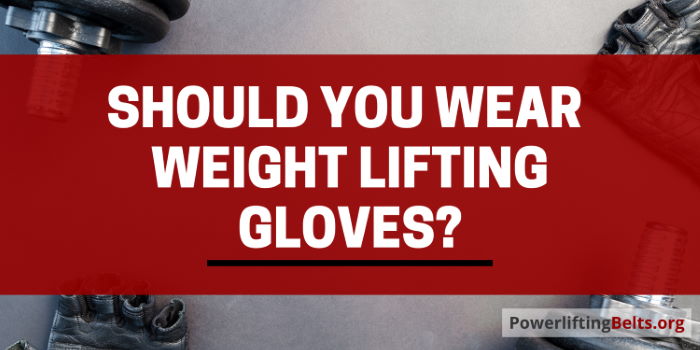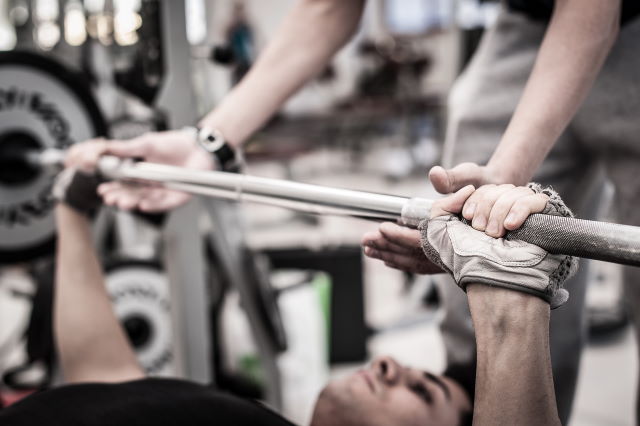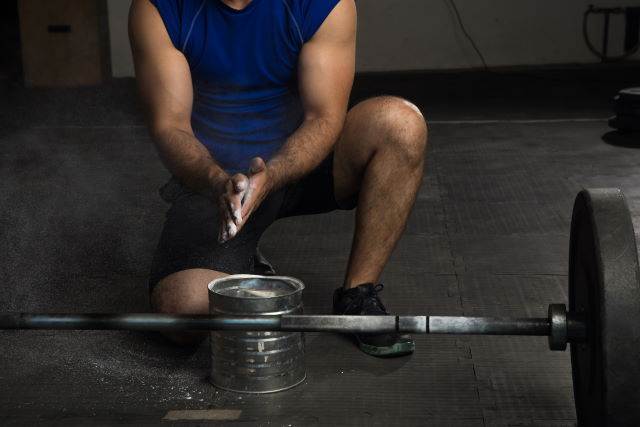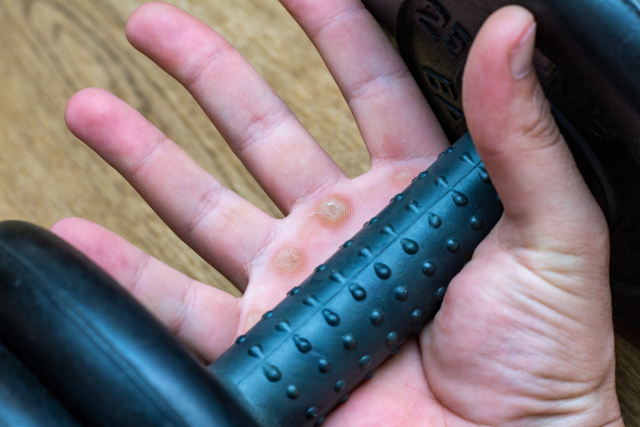
Whether or not you should wear gloves when you lift weights is one of the most hotly debated topics in the bodybuilding scene. Some people swear by gloves, whilst others prefer to keep it simple with bare hands. In this article we’re going to help you find your answer to the question – “should I buy weightlifting gloves?”.
First and foremost, you mustn’t let either camp try and talk you around to their point of view.
Although they may seem very persuasive, the truth is that it all comes down to personal choice. To help you out, we’ve laid out the pros and cons of wearing, and not wearing, weightlifting gloves below.
Read on to find out whether or not unisex or female weight lifting gloves are for you and if they can help you get a grip in the gym.
Why Wear Weightlifting Gloves?
There are a few different reasons why a lot of gym-goers decide to wear weightlifting gloves:
For Better Grip
If you have exercised with some heavy weights, your lack of grip may have been an issue at some point. Whether it be from being unable to grip dumbbells for long enough to complete your workout set or sweaty hands causing the bar to slip from your palms.
Slippery hands also increase the risk of injury.
Weightlifting gloves are designed to help you firmly grip the weights. So you can focus on your lifting technique and using the correct form instead of worrying about your hands.
Issues with grip stability can also hinder your progress as your hands get exhausted before the muscle that you are trying to exercise do. If you are using a thicker bar, your grip may be impeded even more, especially if you are using something like Fat Gripz. So by adding a solid pair of gloves, you may find that you can get through a plateau.
To Protect The Fingers
If you’re lifting heavy weights all the time, then it makes sense that you might want to add some extra protection for your fingers. Training gloves can take a lot of strain off your fingers and stop the abrasive metal rubbing on your palms.

Tendonitis is a very common injury for inexperienced weight-lifters, particularly in the middle finger which takes most of the strain when lifting weights. Gloves can help prevent tendonitis, which is an injury that could put you out of the gym for a few days.
Gloves don’t allow you to lift heavier weights, but gloves help reduce the overall impact on your hands.
This is likely to encourage you to continue lifting weights and trying to improve. Workout gloves with wrist straps built in can help to prevent wrist injuries.
To Decrease Calluses
This is probably the most contentious issue on this list, as will become clear later on. Many people choose to wear lifting gloves to stop calluses from building on their hands.
Calluses are rough spots on your hand that form as a result of the friction between your skin and the weight bar.
Calluses can be very painful as they first start to form, and can get even worse if you continue to work out with them. Gloves help reduce how fast calluses can form and therefore reduce the pain from gripping the weight bars.
Besides, most people don’t want cheese-grater hands.
No Need For Chalk
A lot of gyms don’t allow their patrons to use chalk on their hands inside their gyms. Putting chalk on your hands provides extra grip when lifting barbells. Chalk dust can cause breathing issues or sneezing when it gets in the air, so it’s good to have weightlifting gloves as an alternative.

Weightlifting gloves provide loads more grip on the bar than bare hands. This stickiness usually makes people think they have a much higher grip strength than they do. This is a good thing as it reduced the risk of injury, but it’s important to not become too reliant on your gloves.
Overall, it’s hard to argue that gloves don’t improve your grip for weight lifting, especially if you have sweaty hands.
To Protect The Hands From The Environment
If you exercise in a colder climate, grasping a cold steel barbell when barehanded is not easy. Full-fingered gloves are useful here as they can improve grip and keep your hands warm.
Gyms are often not very clean places. Dusty floors or rusty weight plates are common. Gloves are useful in these situations to keep your hands clean from dirt and dust. They also protect from abrasion or scratches from workout equipment.
If you use anything wood, such as calve raises on a wooden block, gloves are also useful to protect your hands from splinters in the gym.
The Cons Of Weightlifting Gloves
Now that we’ve talked about why some gym lovers think that wearing gloves is the way to go, it’s time to discuss the opposite view – that weightlifting gloves are completely unnecessary.
Some just prefer lifting straps instead of gloves. People who hold this belief also have a couple of different reasons, which are as follows:
To Increase Calluses
You may be confused about this one since we just explained why it’s a good thing to reduce calluses forming on your hands. However, there are some benefits to building on calluses on your hands that can help you out in the long run.

You can think of this as toughening your hands up so that they can stand up to a regular beating in the gym. A regular gym user who has developed calluses on their hands over a long period will be able to lift heavier weights without the need for an extra layer of protection on their skin.
It’s important to understand that it really does take a long time to build up this rough skin, and it will involve quite a lot of pain!
Less Need When Performing Pulling Exercises
Many people who don’t like to wear gloves will argue that they can have a negative effect on your pulling exercises. Specifically, they think that for exercises such as pull-ups, gloves reduce your grip strength and mean you give up before you’ve fully exhausted your muscles.
This can result in lower gains and less exercise efficiency. Considering that making gains is the main reason people go to the gym, this is a pretty big disadvantage.
To Strengthen Hand Grip Naturally
Many lifters claim that using these lifting accessories can hinder grip strength development. There is some truth to this as they do improve your ability to grip, so you can grip more with weaker hand muscles.
But with a little amount of exercise on the forearms, you shouldn’t have any issues. By adding some forearm exercises to your routine, you will improve the strength of your grip.
To Avoid Skin Irritation
Using sweaty gloves over a long period of time may cause skin irritation. If they are not washed, they can also cause bacteria to grow.
These factors can lead to skin irritation and rashes. But if you already have a skin condition, gloves can provide an additional layer to protect your skin.
This can be prevented by using fingerless gloves manufactured from a breathable material.
What Lifting With Gloves Says About You
So, to summarise. Gloves have a number of benefits as well as a couple of drawbacks. Lifting gloves help with holding the bar and can take a lot of strain off your naked hands.
However, weight lifting gloves prevent you from reaching your maximum performance on pulling exercises and don’t allow you to build up calluses.
In our opinion, why not get the best of both worlds? We recommend picking up a pair of gloves that you can wear for lifting weights and then remove them for pulling exercises. You’ll also then have the straps available to protect your wrists during long sessions.
FAQs
Do Gloves Affect Grip Strength?
Although a pair of weightlifting gloves might give the illusion of more grip strength, this isn’t the case. Gloves simply improve your grip on the bars by providing more friction to stick onto them.
There isn’t a way that gloves can make you grip tighter or lift heavier weights.
Should You Use Gloves When Lifting Weights?
It all comes down to personal preference. There are advantages and disadvantages to using gloves so you should weigh them up for yourself. Our article above goes through all of these factors so we’d recommend starting there.
Are Weightlifting Gloves Good Or Bad?
For a lot of people, weightlifting gloves are really good and make their gym sessions a lot more pain-free and enjoyable. Other people prefer to go in with bare hands and try and build up resilience in their skin and fingers. It all depends on what you prefer.
Which Gloves Are Best For Weightlifting?
Gloves with wrist strapping are always great for weight lifters, especially those who are starting to lift some seriously heavy bars. Having said that, there are lots of different types of gloves and everyone has their preference.
It might take a few different pairs before you find the perfect glove for you.
Leave A Comment